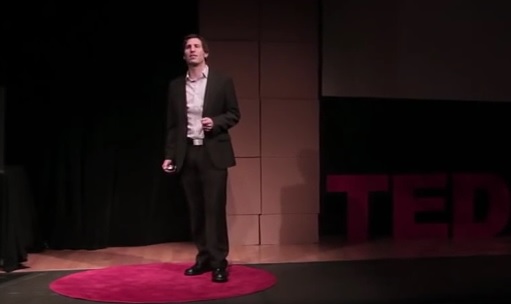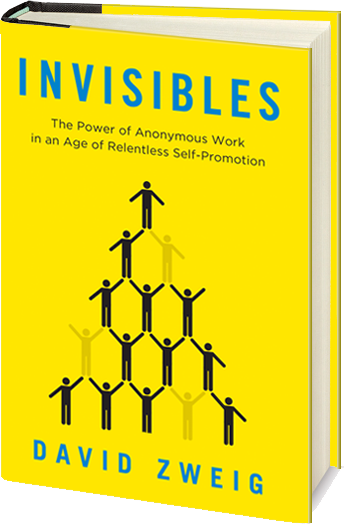

How many of you feel that your patients, hospital administrators, and even some of your own colleagues really understand and appreciate what you do every day? How much of your work and effort goes unseen?
Today we’re excited to welcome David Zweig. David is the author of “The Invisibles,” a deep dive exploration of the quiet professionals who are indispensable to our modern life. David is a familiar face to many of you, he’s written for publications such as the New York Times, The Wall Street Journal, The Atlantic and the Harvard Business Review. We have a link to his Ted Talk in the show notes that’s definitely worth checking out.
So, what does a Structural engineer, a perfume tester, a UN translator, a sound engineer for Led Zeppelin, an anesthesiologist, a cinematographer and a Guitar Tech for Radiohead all have in common?
They are the elite professionals who work quietly and meticulously behind to scenes in ways that are both indispensable and invisible. Many of us have no idea who they are or what they do…unless of course, something goes wrong.
The “Invisibles” in David’s book share several key traits:
-Ambivalence toward recognition: they’re just not interested in the spotlight.
-Meticulousness: they will not accept sub-par work, even when no one is watching.
-Savoring of responsibility: they know how critical their job is even if no one else does.
Does this sound like you? If so, you’re not alone. We’re going to explore peers outside of medicine such as UN translators who can juggle multiple languages, translating high level government negotiations in real time. They are under such intense cognitive load, they actually take structured breaks, just like air traffic controllers
We’re going to learn how invisibles, such as these, manage the stress and pressure of their jobs. Even with all the pressure and demands these professionals work under, many of them report the highest levels of professional satisfaction, and lowest levels of burnout.
This was a great conversation and there’s much more to explore in David’s book and the show notes. With that said, let’s get started.
Show Notes:
-David was one of the invisibles.
-The better he did his job, the more he disappeared.
-People who only get credit when something goes wrong.
-An inverse relationship between work and recognition.
-What do fact checkers and anesthesiologists have in common?
-“If you want to get fruit-baskets from patients, don’t go into anesthesiology.”
-The lead guitar tech for Radiohead and a perfume tester.
-Who is more successful? Those who seek high visibility or those who focus on their craft?
-How attention seeking and today’s social media landscape can be huge distractions.
-Really good work does get ultimately get recognized.
-What does a factchecker do?
-Cinematographer, Robert Elswit. A Master collaborator.
-“We,” not “I.”
-How can invisibles communicate their value to patients, govt, public, etc. without resorting to selfless promotion?
-Can you really measure the productivity and value of top performers? Can the work of physicians and other invisibles really be broken down into metrics?
-When does an invisible have to step up and make their voice heard?
-Burned out? How a focus on extrinsic motivation can leave you susceptible to burnout.
-Why you need to challenge yourself professionally.
Links:
“J&J to Stop Selling Automated Sedation System Sedasys.”
http://www.wsj.com/articles/j-j-to-stop-selling-automated-sedation-system-sedasys-1457989723
Cinematographer, Robert Elswit:
http://www.imdb.com/name/nm0005696/
Harvard Business Review: “Managing the “Invisibles.”
https://hbr.org/2014/05/managing-the-invisibles
David’s website:
2016 Survey of America’s Physicians:
Click to access Biennial_Physician_Survey_2016.pdf
David’s Book:
David’s Ted Talk:
Dig deeper into David’s research:
CBS Interview:
Very interesting podcast presented by Colin Miller and Keith Menkin with guest speaker David Zweig. Have worked in healthcare for many years and came in contact with many ‘invisibles’ day to day in my hospital setting to include Anesthesiologists. I witnessed on a regular basis what impact these ‘invisibles’ had on patients’ quality of care. I totally agree with David, that the focus should not be on one’s own notoriety or financial rewards, but on the best you can provide with your particular profession. He also emphasized the importance in challenging yourself to improve what you do. This can be more rewarding than recognition or monetary gain. He stressed that this will come in time, but to seek it can only increase stress & anxiety and not necessarily be successful.
On occasion, patients or families will remark how such ‘invisibles’ as the CNA, Lab Tech, Chaplain,
Counselor, Case Manager, Physical Therapist, Volunteer (to name a few) made a huge impact in their quality of care and helped them move forward to better health and plan of care.
This, to me, is the greatest reward and why I believe so many of these ‘invisibles’ stay in their professions for as long as they do. Again, agree with David, that these employees will get their
recognition or other rewards in time, if they continue to put their best into their jobs on a daily basis.
Have not read David Zweig’s book, but would love to. Sounds very interesting. Thank you for this
enlightening podcast!
LikeLike